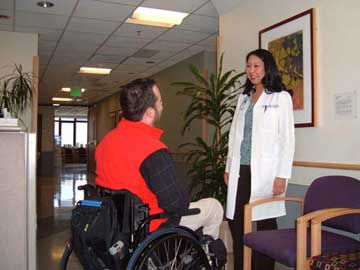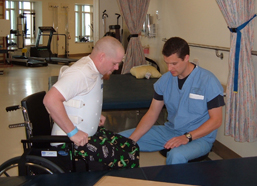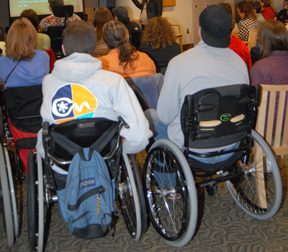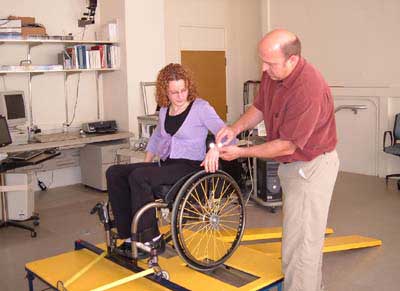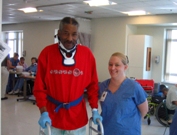Fall 2001: Volume 10, Number 3
Improving SCI Care Across Cultures
Between 1997 and 2000 the NWRSCIS conducted a small study designed to evaluate and improve SCI rehabilitation care for people from a variety of ethnic and cultural minorities. Called "Improving Cross-Cultural Competency in Providing Care for SCI Patients," the study surveyed patients and rehabilitation staff to identify the treatment needs of different populations.
Fifty-seven individuals with SCI who had been treated at the University of Washington Medical Center (UWMC) or Harborview Medical Center (HMC) were interviewed for this study. Thirty-two (58%) were Caucasian and 25 (42%) identified themselves as ethnic or racial minorities: 14 (25%) African American; 5 (9%) Native American; 3 (5%) Hispanic; 1 (1%) Asian; and 2 (2%) other. Most study subjects were male (85%-95% in each group), and the average age was 37 in all groups. More people in the Caucasian group were employed at the time of injury than in the minorities group (94% versus 64%), and more minorities reported difficulties in their lives (e.g., trouble with the law, difficulty holding a job, drug/alcohol problems) before injury (44% versus 3% for Caucasians). More minorities were injured by gunshot wound or assault than Caucasians (40% versus 6%). Motor vehicle accidents were the most frequent cause of SCI among Caucasians (63%). There were no differences between groups in level of injury.
A large majority of people in the study rated the rehabilitation care they received as very good to excellent, and there were no significant differences between the minority and Caucasian groups in terms of satisfaction with the care they received. These findings are very preliminary, however, because the study sample was small, and all the subjects could speak some English and none required interpreters. It is possible that researchers may have found more differences between groups if patients who needed interpreters were interviewed for the study.
A survey on cultural competency was given to 46 staff members at UWMC and HMC representing all rehabilitation medicine disciplines. Overall, staff reported high job satisfaction and gave themselves high ratings of competence and comfort in working with patients of different ethnic, racial, or cultural backgrounds, but they reported problems when working with interpreters.
Although the results of the patient survey did not point to clear deficiencies requiring staff training, responses to the staff questionnaire led to the Conference on Cultural Competency in Health Care in August, 2000. Conference goals were to increase staff awareness of and respect for cultural differences of patients and to help staff more effectively communicate with patients through an interpreter.

